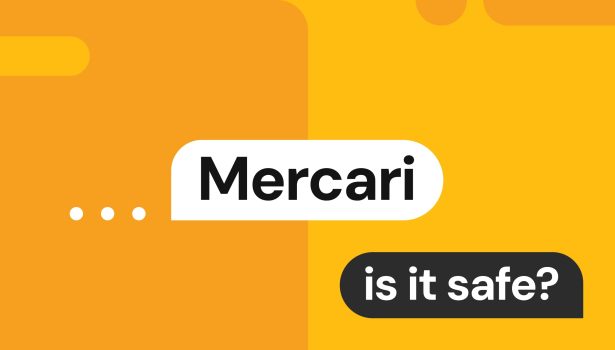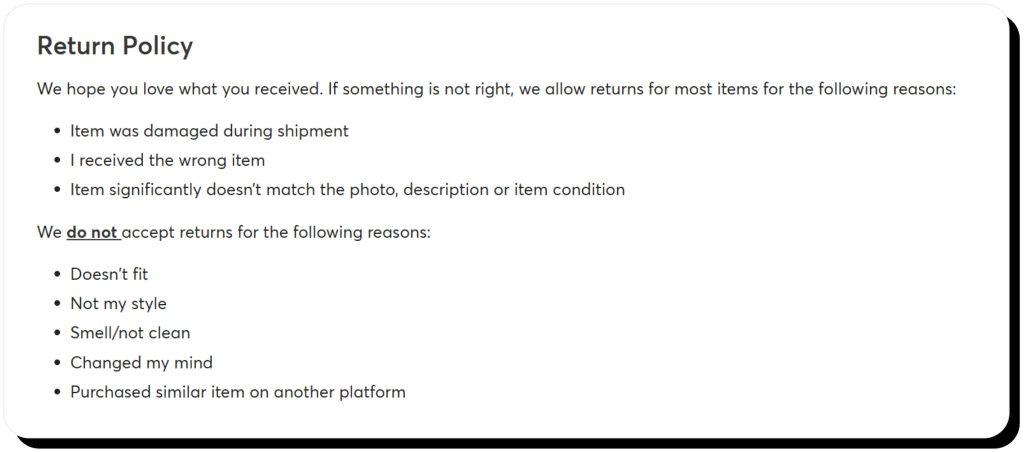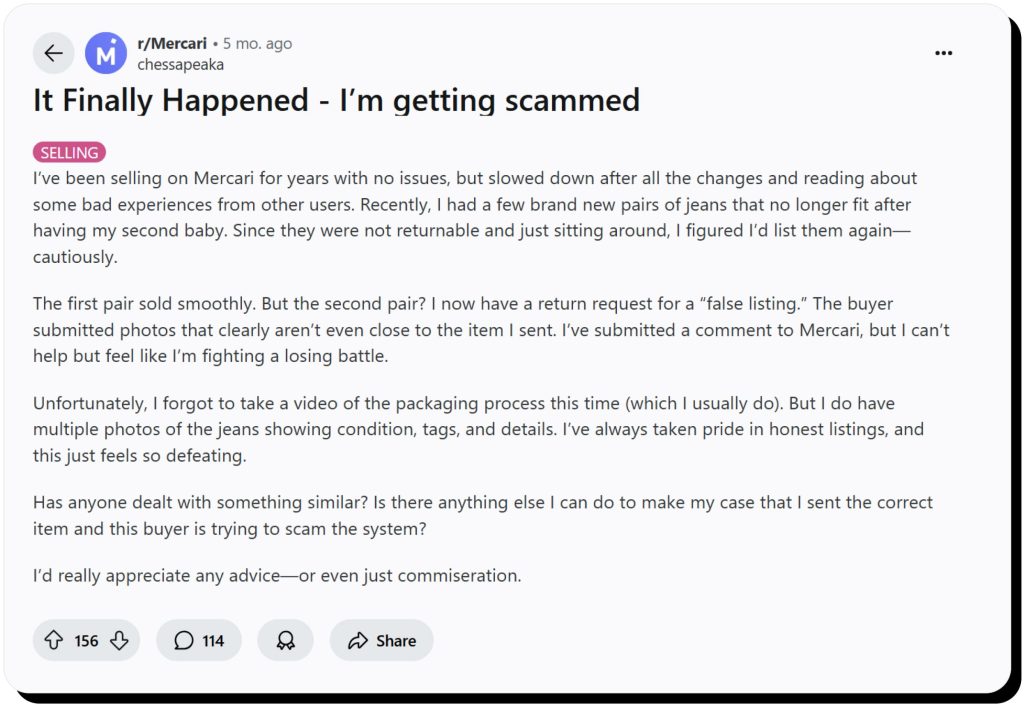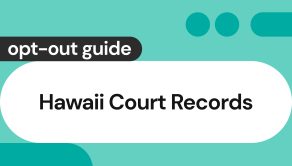Is Mercari safe? A complete 2025 review of protections, risks, and tips

Mercari is safe to use, as long as you’re exercising caution and staying up to date with its policies. It’s a legit platform, and it just so happens to be Japan’s largest online marketplace for peer-to-peer sales.
The most important thing is to be aware of scams that may occur on the platform. Like other consumer-to-consumer marketplaces, Mercari attracts plenty of scammers who are adept at phishing, bait-and-switch, and other deceitful schemes.
Is Mercari legit? An overview of the platform
Mercari is a legitimate site and mobile app to buy and sell stuff on. Founded in 2013 and based in Tokyo, the company’s valuation exploded throughout the 2010s, reaching unicorn status (more than US $1 billion) in 2016. It was the first pre-IPO Japanese startup to do so.
It expanded into the U.S. market in 2014 (just a year after its founding) and by 2018 had been downloaded by U.S. users more than 30 million times. As of 2025, Mercari is estimated to have around 50 million downloads.
How does Mercari work?
Mercari is a platform for peer-to-peer (P2P) transactions, and it takes on the role of transaction facilitator in exchange for a fee on each sale (paid both by sellers and buyers). In this sense, it’s similar to U.S. equivalents like Poshmark and eBay.
It started as a mobile-first app, but later the company expanded to a web/desktop version to reach more users. The smartphone app is currently free to download on Google Play and the App Store.
Listing goods for sale is free, and you can list pretty much anything aside from prohibited items like firearms and drugs. Mercari helps protect buyers by not releasing funds to the sellers until the buyer rates them OR three days go by after the item arrives.
The platform is committed to being a consumer-to-consumer (C2C) platform, so it doesn’t allow drop shipping. Sellers are required to have proof that they have an item in their possession before they can sell it. That said, some Redditors have noticed that suspected drop shippers are often allowed to continue their operations unabated.
People who are making more than $20,000 in gross sales and more than 200 transactions from Mercari are required to fill out a 1099-K form to report their earnings.

Is Mercari safe to buy from?
Mercari is indeed safe to buy from. In fact, some users say that Mercari tends to prioritize buyer protection more than seller protection.
The following measures help ensure a smooth shopping experience:
- a free shipping label to return any approved claim about a counterfeit or inaccurately described item, as long as you report it within 3 days
- product monitoring via predictive analytics to identify and remove counterfeit, stolen, or prohibited products from the site
- round-the-clock customer support via email and phone support during regular business hours in Pacific Standard Time
- seller rating system and profile verification to help assess their reliability and past performance and identify the ones you can trust
Mercari is not without its limitations, of course. If you fail to realize a product is fake within the 3-day window or before giving it a review (and by default, accepting it), protections don’t apply. Returns also aren’t accepted if an item doesn’t fit, isn’t clean, you simply don’t like it, or you changed your mind.

Additionally, you’ll have to keep in mind that scammers aren’t tremendously concerned about offering a great buying experience or preventing their accounts from getting suspended. They’ll find ways to circumvent the obstacles—that’s their modus operandi.
Is Mercari Authenticate reliable?
Mercari works with third-party luxury authenticators to review certain listings and give them a “Diamond Seal of Approval.” It is optional but requires a fee from the seller. The authentication is done via photos—items aren’t manually inspected.
With this system, shoppers can trust that a high-end product is indeed legit, even when offered at a huge discount. However, many users raise concerns stating the process isn’t robust enough to guarantee product legitimacy.
Is Mercari trustworthy for sellers?
Mercari is relatively trustworthy for sellers, as long as you stay up to date with the fees and shipping policies:
- If a buyer doesn’t rate a product or request a return within 72 hours after delivery, the funds are automatically released to the seller.
- Items sent using the Mercari prepaid shipping label are covered against loss or damage during transit.
- If a buyer falsely claims “item not received,” valid tracking showing delivery protects the seller.
- Buyers can’t return the items they simply don’t like or have changed their mind about. During disputes, sellers can submit evidence (photos, tracking, receipts) for Mercari to evaluate whether the return request is valid.
- After a transaction is completed, sellers can rate buyers, helping future sellers spot reliable customers and avoid problematic ones.
On the other hand, Mercari is also notorious for making changes to things without giving sellers sufficient advance notification. For example, on Black Friday of last year, some sellers noticed that the discount required for being boosted in the search results had gone from 5% to as high as 30% with no notice given whatsoever. In another example, Mercari gave less than 24 hours’ notice when it got rid of Mercari Local, a local delivery option built upon a partnership with Uber.
Common Mercari risks to be aware of
Even with identity verification in place, P2P platforms are still relatively easy to abuse by scammers. To stay on the safe side, it’s crucial to know the most common threats as well as emerging fraud schemes.
Here are 5 common risks associated with Mercari:
- Counterfeit items. Even if a product has been evaluated by Mercari Authenticate, there’s still no guarantee it’s 100% legit. Since the authentication is done via photos, fraudsters can simply send a different item (not the one submitted for authentication). On the other hand, sellers are scammed as well—fraudsters request a return but send a counterfeit product, not the authentic one they purchased.
- Giving your private data to phishing scams. There are numerous techniques scammers use to elicit your personal info. They may ask for it when negotiating a listing, send malicious links that download spyware on your device, or impersonate Mercari support and claim they need your info to fix some “issue.”
- Off-site payments. Fraudsters will lure you into completing the transaction outside of Mercari, typically through apps like Cash App, Venmo, or Zelle. Doing so voids all Mercari protections, leaving you unable to get your money back.
- Sudden policy or fee changes. Mercari has a history of rolling out changes without much advance notice. These can make your margins shrink overnight or impact visibility in search. While these changes are part of running a business on third-party platforms, the unpredictability can make planning difficult.
These risks aren’t exclusive to Mercari—they are typical for many peer-to-peer marketplaces. Fraudsters are constantly adapting their tactics so even experienced buyers and sellers can be caught off guard. The best defense is staying informed: read our guide on Mercari scams to learn what red flags to look for and how to avoid costly mistakes.
Tips for using Mercari safely
Mercari does its job of protecting its users, but much depends on the users themselves. Here are the tips you should keep in mind when selling or buying on Mercari.
For buyers:
- Examine seller ratings and reviews. You want to see a few dozen reviews at the bare minimum, and look for a range of writing styles and variation in the amount of detail provided. If there are only a few reviews that all sound the same or just show 5 stars, that’s a potential red flag.
- Scrutinize the product description and photos. Ask for more detailed or close-up photos of things like tags, logos, and stitching if you’re not convinced. A person who actually has the item in their possession should be able to easily provide these. If they say they’re “not home,” it’s probably a good idea to wait until they are.
- Don’t cave to any requests to take the convo or transaction off-platform. Avoid switching over to WhatsApp for messaging, and stick with Mercari’s payment system rather than using Venmo or Zelle at the seller’s request. If a seller insists, they’re probably trying to circumvent Mercari’s monitoring and buyer protections.
For sellers:
- Check buyer ratings. If a buyer has a history of problematic behavior (frequent returns, false claims), you’ll be able to see it in reviews from other sellers.
- Use Mercari Authenticate if you’re selling a luxury item. This is good for sellers as well as for the buyers, since it can help make people feel more comfortable purchasing your item. But most importantly, it shows Mercari that you’ve done your due diligence, and it will be harder for someone to pull a counterfeit-claim scam on you.
- Use Mercari’s prepaid shipping labels. They include tracking and insurance, which protect you if a buyer claims an item wasn’t delivered.
- Document everything. From the product itself to the packaging before you ship—these will help you in case a buyer tries to file a false claim.

Mercari vs. competitors: safety comparison
Is Mercari safer than other P2P resale sites like OfferUp, eBay, or Poshmark? It depends on whether you’re a buyer or a seller. As we touched on earlier, Mercari tends to side with buyers over sellers in disputes. On the other hand, the frequency of scams on these types of sites depends largely on how popular they are and what identity verification methods they use (if any).
Mercari vs. eBay
Mercari releases funds when the buyer rates or automatically 72 hours after carrier‑confirmed delivery if no return is requested. eBay does this slightly differently: it holds funds for new sellers by default, and then on a case-by-case basis (sometimes for up to 30 days).
In 2021, in response to lots of luxury watches being sold on its site, eBay introduced an external escrow service for buyers and sellers of watches priced at more than $10,000. Instead of holding onto funds itself, eBay partners with Escrow.com to give buyers of high-ticket items peace of mind.
Mercari vs. OfferUp
OfferUp is heavily geared toward local, in-person deals. These don’t have robust protections and once the item is given away, the deal is irreversible. For an extra fee, OfferUp will help take care of both shipping and payment through their app via partnerships with Stripe and USPS. This drastically improves payment protection and traceability, but again, it adds some cost to the initial transaction. Like Mercari, OfferUp has a voluntary identity verification program and a user profile rating system that help users decide whom to trust.
Mercari vs. Poshmark
Like Mercari, Poshmark gives buyers 3 days to inspect items and request a return if there’s an issue, after which funds are released to sellers. It also provides Posh Authenticate for high-value luxury goods. However, in Poshmark’s case, items are sent for manual verification before reaching the buyer.
FAQs
What is Mercari, and is it safe?
Mercari is a resale app based in Japan. It’s strictly against allowing drop shipping on its platform, instead focusing on consumer-to-consumer (C2C) transactions. It uses rating systems, optional identity verification, temporary funds withholding, and predictive analytics-based monitoring to give sellers and buyers the safest possible experience.
Is Mercari a legit site?
Mercari is indeed legit—in fact, it’s one of Japan’s most popular mobile-first resale platforms. It’s been around since 2013 and has staked out significant territory in the U.S. market despite having the likes of eBay and Poshmark to compete against.
Is Mercari a trusted website?
Mercari is a trusted website, although some of the people trying to use it may not be trustworthy themselves. Despite efforts to protect both buyers and sellers on the site, overpayment scams, phishing, and counterfeit sales still occur here and there.





Mark comes from a strong background in the identity theft protection and consumer credit world, having spent 4 years at Experian, including working on FreeCreditReport and ProtectMyID. He is frequently featured on various media outlets, including MarketWatch, Yahoo News, WTVC, CBS News, and others.